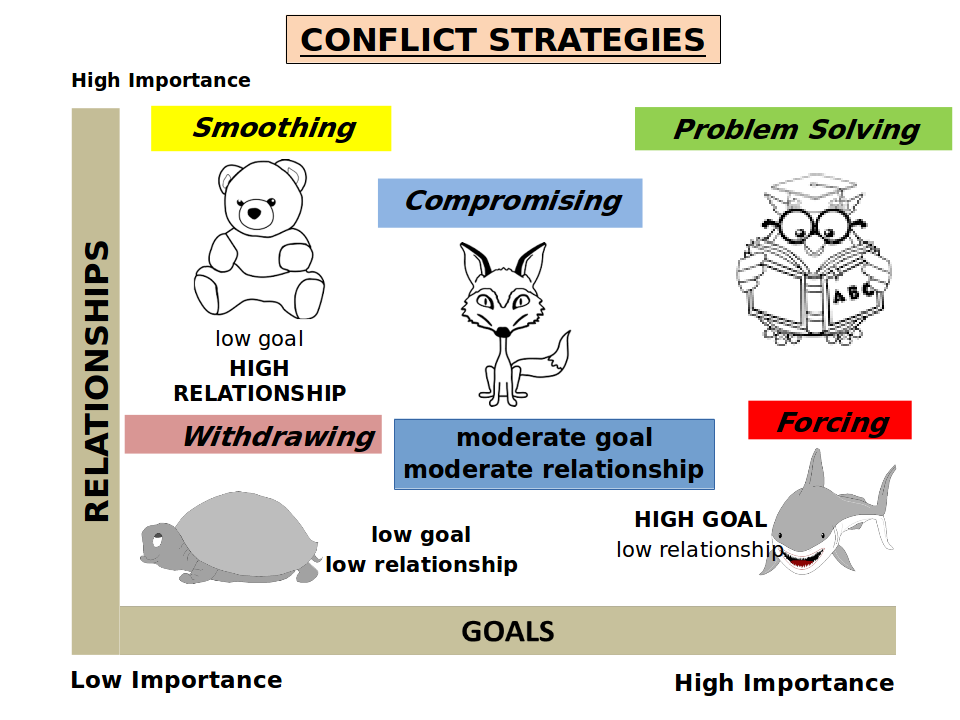Conflict Resolution Matrix - THOMAS-KILMANN CONFLICT MODES

Tortoise - Withdrawing
Low value on goal, low value on relationship.
Tortoises believe it’s hopeless to try to resolve conflict and avoid people and issues that may cause conflict. The tortoise feels helpless in reaching personal goals and refuses to cooperate with others in reaching theirs.
You don’t value the outcome, you also don’t value the relationship with the person. You withdraw from the conflict.
Conflict with this type might feel like … Tortoises neither talk nor listen. You seldom will get a chance to discuss the issues.
Situations where appropriate
- Issue is trivial
- Potential dysfunctional effect of confronting the other part outweighs benefits of resolution
- Cooling off period is needed
Situations where inappropriate
- Issue is important to you
- It is your responsibility to make decisions
- Parties are unwilling to defer, issue must be resolved
- Prompt attention is needed
Shark - Forcing
High value on goal, low value on relationship.
Sharks force others to accept their way, oblivious to needs or feelings of others. Sharks believe conflicts are settled by one person winning and one person losing. Sharks want to win and will fight at any cost to do so.
You see high value on the goal, but low value on relationship. This may be approrpiate in situations where there is not a long term relationship (i.e. you are not going to see the individual again) but you value the service.
i.e. bad service in a shop.
Conflict with this type might feel like … While you’re talking, Sharks are thinking of the next argument to defeat you.
Situations where appropriate
- Issue is trivial
- Speed by decision is needed
- Unpopular course of action is implemented
- Necessary to overcome assertive subordinates
- Unfavorable decision by the other party may be costly to you
- Others lack expertise to make technical decision
- Issue is important to you
Situations where inappropriate
- Issue is complex
- Issue is not important to you
- Both parties are equally powerful
- Decision does not have to be made quickly
- Subordinates possess high degree of competence
Teddy - Smoothing
Low value on goal, high value on relationship.
The Teddy Bear soothes. More than anything else, Teddy Bears want others to like and accept them. Teddy Bears are quick to accommodate to others and to ignore their own needs because they believe asking others to meet personal needs will harm the relationship.
The outcome isn’t important, the relationship is more important.
Conflict with this type might feel like … When Teddy Bears talk, everything sounds just fine. When you talk, they’re listening and agreeing with everything you say.
Situations where appropriate
- You believe that you may be wrong
- Issue is more important to the other party
- You are willing to give up something in exchange for something from the other party in the future
- You are in a position of weakness
- Preserving relationship is important
Situations where inappropriate
- Issue is important to you
- You believe that you are right
- The other party is wrong or unethical
Fox - Compromising
Moderate value on goal, moderate value on relationship.
Foxes compromise. A fox will give up some goals if you’ll give up some of yours. The Fox is similar to the Owl, but less optimistic about conflict bringing an improved relationship.
Conflict with this type might feel like … When Foxes are talking, they’re diplomatic but persuasive. When you talk, the Fox is trying hard to figure out some compromise.
Situations where appropriate
- Goals of parties are mutually exclusive
- Parties are equally powerful
- Consensus cannot be reached
- Integrating or dominating style is not successful
- Temporary solution to a complex problem is needed
Situations where inappropriate
- One party is more powerful
- Problem is complex enough to need problem-solving approach
Owl - Problem Solving
High value on goal, high value on relationship.
Owls confront openly and fairly. Optimistic about conflict, Owls are committed to their personal goals and to others goals. Owls begin discussion by identifying openly the wishes of both, and are never satisfied until a solution is found that satisfies both. “
Conflict with this type might feel like … When Owls talk, they may come on strong, but when you talk, they are listening carefully and sympathetically.
Situations where appropriate
- Issues are complex
- Synthesis of ideas is needed to come up with better solutions
- Commitment is needed from other parties for successful implementation
- Time is available for problem solving
- One party alone cannot solve the problem
- Resources possessed by different parties are needed to solve their common problems
Situations where inappropriate
- Task or problem is simple
- Immediate decision is required
- Other parties are unconcerned about outcome
- Other parties do not have problem solving skills
References
Helping teams deal with conflict
Conflict - Thomas-kilman-conflict-mode-instrument
Conflict Style - Interpreting Your Scores

